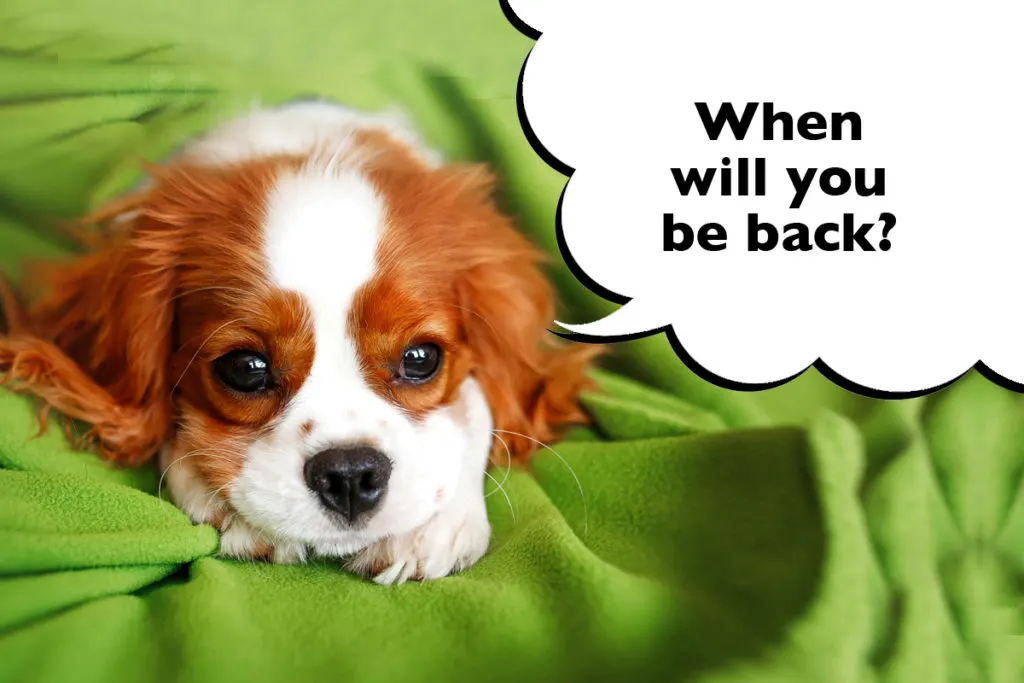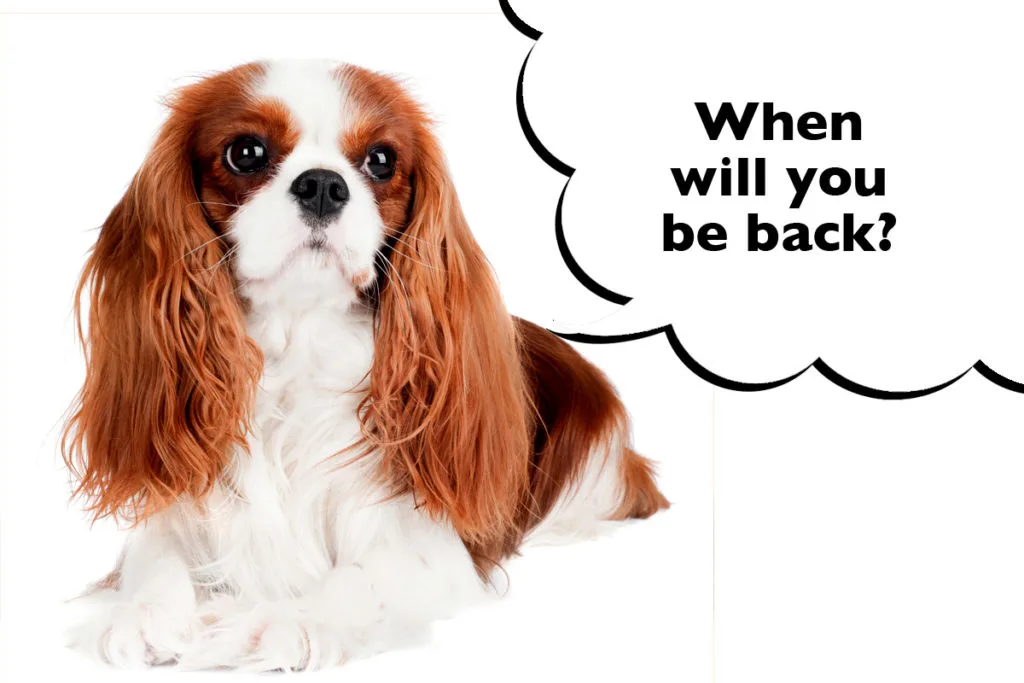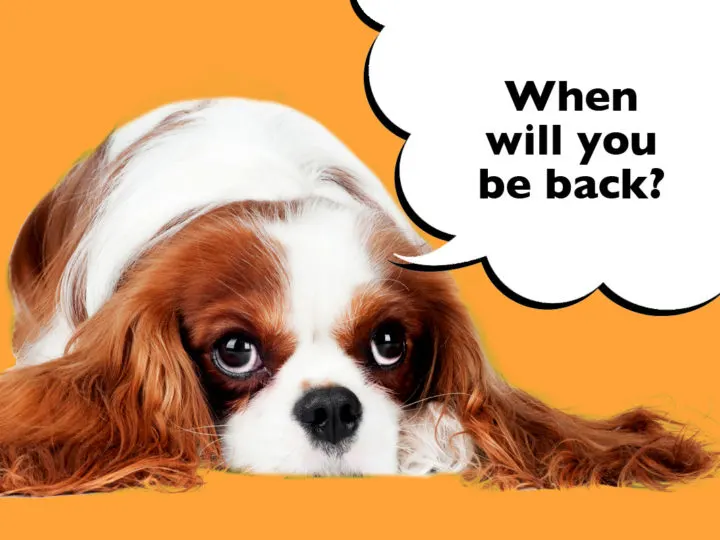Do you have a Cavalier King Charles Spaniel? Are you concerned about their anxiety when you leave the house? Here’s everything you need to know about Cavalier King Charles Spaniels and separation anxiety!
Do Cavalier King Charles Spaniels Get Separation Anxiety? Yes, Cavalier King Charles Spaniels are prone to separation anxiety which isn’t surprising given they were bred as companion dogs. According to Furbo, manufacturers of pet cameras, they’re the third most common breed to get separation anxiety.
Read on to find out what separation anxiety actually is, what symptoms to look out for, and for tips on how to desensitise your Cavalier to you leaving the house.
Never use the advice in this article as a substitute for professional veterinary advice or treatment. I am NOT a Vet, qualified dog trainer or dog behaviourist. This article is based on research, personal opinion and experience of owning dogs over the last 12+ years.
What Is Separation Anxiety In Cavalier King Charles Spaniels
Separation anxiety is when your Cavalier King Charles Spaniel feels anxious and distressed when you’re not around.
This can happen when you’ve gone out for a few hours, or even when you’re not in sight. For example, if you go upstairs or into another room.
Cavaliers form very strong, loving bonds with their owners and can quickly feel anxious if they’re separated from them.
Without careful and consistent training, separation anxiety can rapidly become a big problem for your Cavalier, and for you too.
Even owners who are fortunate enough not to have to leave the house for long periods, will still have to run errands at some point.
This can be highly distressing for your Cavalier if their separation anxiety is severe.
What Are The Symptoms Of Separation Anxiety In Cavalier King Charles Spaniels?
If your Cavalier King Charles Spaniel shows any of these signs when they’re left alone, then they may have separation anxiety:
- Howling, crying or barking excessively
- Chewing or destroying furniture or other items
- Pacing around the house
- Scratching at walls or doors to try and escape
- Weeing or pooing in the house
- Coprophagia (eating their own faeces)
- Self-mutilation (licking or chewing their feet, skin or fur obsessively)
- Ignoring food or treats you’ve left for them
- Attention seeking behaviour before you’re about to leave

How Can I Help My Cavalier King Charles Spaniel’s Separation Anxiety?
If your Cavalier King Charles Spaniel has separation anxiety, there are some things you can do to help them.
But remember, helping them overcome their separation anxiety is often a lengthy process.
Don’t rush your Cavalier too quickly, and never punish them for feeling anxious. This can make their separation anxiety much worse.
Here are some tips to help your Cavalier King Charles Spaniel with separation anxiety:
Get A Furbo Camera To Watch Your Cavalier When You Go Out
Getting a camera to keep an eye on your Cavalier is a great idea! This way, you know exactly what they’re up to when you’re not with them.
Some cameras also have a microphone so you can talk to your Cavalier to reassure them.
Some dogs find this comforting, but others feel stressed because they can’t see you. So, always do what’s best for your own situation.
Desensitise Your Cavalier King Charles Spaniel To You Leaving Them
Separation anxiety starts before you actually leave your Cavalier King Charles Spaniel.
Humans tend to do things in the same order each day. And, because your Cavalier is smart, they’ll soon realise when this chain of events happens, they’re about to be left alone.
So this means you need to work on ways to desensitise them to you leaving your home.
Pick up your keys, put on your coat and shoes, but don’t actually leave the house to start with!
Just sit down and read a book or have a coffee. Try to make it no big deal.
Then reward your Cavalier for staying calm with a tasty treat.
When they’re comfortable with you doing this, do the same thing again but go into a different room of the house for a few minutes, then half an hour and so on.
Build up the time from there until you can actually leave the house.
Eventually the sight of your picking up your keys and putting your shoes on won’t have any effect on them as the trigger will be gone.
This may take some time, but it’s a crucial part of the process.
If you’re Cavalier is anxious from before you actually leave the house, it’s going to be much more difficult for them to settle down when you go out.
Walk Your Cavalier King Charles Spaniel Before You Leave Them
Making sure your Cavalier King Charles Spaniel is physically and mentally tired before you leave, can make it easier for them to settle when you leave them.
Try calm walks with lots of sniffing, instead of high-intensity games of chase. This can help relax your Cavalier more, instead of hyping them up right before you leave them alone.
Fast-paced games increase the levels of Adrenaline and Cortisol in your Cavalier’s system. This can take hours to return to normal levels, making it much more difficult for them to feel calm when they’re left alone.
Give Your Cavalier King Charles Spaniel A Comfortable Bed
Make sure your Cavalier King Charles Spaniel has a comfortable place to rest.
This can be a comfy bed in a quiet room of the house. Or, if they’re used to spending time in a crate already, then this can be a good option too.
Although, you will need to leave the crate door open if you’re going out for any length of time.
Anywhere where your Cavalier feels safe, secure and comfortable is great! This can help them relax and settle down while you’re away from them.

Don’t Make A Fuss About Leaving Your Cavalier King Charles Spaniel
If you make a big deal about leaving your Cavalier King Charles Spaniel, this can make them more stressed.
They’ll pick up on your anxiety, which can leave them feeling more anxious themselves.
Instead, leave the room calmly without any over the top affection. Try to act like it’s no big deal that you’re going out.
The same rule applies when you return too. Greet your Cavalier calmly when you get home instead of showing them too much love as soon as you walk through the door!
Although this might be really hard for you, it’s best for your Cavalier in the long run.
Leave Your Cavalier King Charles Spaniel For A Short Time
To begin with, try to only leave your Cavalier King Charles Spaniel for a short time.
Although it might not seem worth it, leaving them for just a few minutes to begin with can be really helpful.
Once they’re feeling more comfortable with this, you can gradually increase the length of time they’re alone for.
Give Your Cavalier King Charles Spaniel A Food Toy
Cavalier King Charles Spaniels love their food! So, giving them a food or puzzle toy can be a great way to keep them busy when they’re home alone.
Kongs stuffed with dog-safe peanut butter (must be xylitol free!), cheese spread, or meat paste are all good ideas. The stronger smelling the fillings are, the more tempting they’ll be for your Cavalier.
The act of licking and chewing are great stress relievers for dogs too. So, not only are you keeping your Cavalier’s mind occupied, you’re helping relieve their stress too.
Keep To A Regular Schedule Of Leaving Your Cavalier King Charles Spaniel
Cavalier King Charles Spaniels with separation anxiety often do better when they’re kept to a routine.
So, if you leave the house at the same time each day, and return at the same time too, then they’ll know what to expect.
They’ll also know that you’ll always come home to them, which can help reduce their anxiety.
If you rarely leave your Cavalier alone, it can be harder for them to adjust to being left at home.
But, if they’re regularly left for short periods, then they’ll be better prepared and start to learn that you’re always coming back.
Give Your Cavalier King Charles Spaniel Regular Breaks
It’s best not to leave your Cavalier King Charles Spaniel alone for longer than 4 hours at a time.
They’re a sociable, friendly dog breed that thrive on spending time with their families.
Even without separation anxiety, they’ll soon become lonely or bored too.
If you do need to leave your Cavalier for longer than this, it’s a good idea to ask friends, family members or a dog walker to help you out.
Teach Your Cavalier King Charles Spaniel To Be More Independent
Cavalier King Charles Spaniels can be a nervous breed. They’re not always particularly confident or outgoing characters, so may need help to become more independent.
You can start this by encouraging them to do things independently without your help or guidance.
Simple things like giving them a tasty chew to enjoy in a different room away from you, can help build their confidence.
Or letting them find hidden treats from around your home and garden can help too.
So, there you have it! Cavalier King Charles Spaniels are companion dogs that are sadly prone to separation anxiety. But, with patient and consistent training to desensitise them to the triggers of you leaving the house, you can make real progress!
What do I do next?
Thank you for reading all the way to the end of this article, your support for my blog means everything to me! If you found this article helpful, please kindly share below. Thank you!

